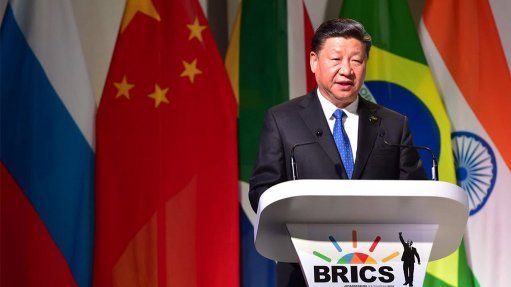
Chinese President Xi Jinping
Chinese President Xi Jinping spent his first decade in office accumulating power at the expense of the Communist Party’s No. 2 official. Now that he’s installed a trusted loyalist as premier, China’s most powerful leader since Mao Zedong is getting more comfortable delegating authority.
Last week, State media revealed Chinese Premier Li Qiang is overseeing the Central Financial Commission created in March — surprising analysts who expected his boss to take the job.
Xi — who has been called the “Chairman of Everything” for the sheer amount of titles he’s accumulated — leads all of the seven central commissions set up before he further consolidated power at a leadership congress last year.
The break with precedent to appoint Li was the latest example of Xi giving his No. 2 more leeway, now the role is occupied by someone he shares a past with. Li served as the Chinese leader’s top aide in Zhejiang province in the early 2000s, and his political ascent has closely tracked Xi’s own trajectory.
His loyalty is being rewarded. In September, Li became the first Chinese premier to represent his nation at a Group of Twenty leaders’ summit, as Xi skipped the meeting amid a geopolitical rift with the host, India. The Chinese leader also dispatched his second-in-command to the Boao Forum for Asia in March, despite attending the event in previous years.
Xi’s decision to disperse his workload is a sign he trusts Li, and wants to test his No. 2’s ability, according to Alfred Wu, an associate professor at the National University of Singapore’s Lee Kuan Yew School of Public Policy.
“The delegating is dynamic, it really depends on Xi Jinping’s needs,” added Wu. “He does not want to engage personally in every single front-line battle.”
Premier Position
During Xi’s first two terms, China’s premier was Li Keqiang, a trained economist considered to hail from a rival faction of the Communist Party to his princeling boss.
Xi embarked on a massive restructuring mission to move policy areas traditionally overseen by the premier in the State Council into Communist Party organs that he controlled. That included creating central commissions on deepening reform, national security, economic and financial affairs, and cyber security.
In March, Xi continued on that path, creating the so-called Central Financial Commission to oversee the country’s banking, insurance and securities assets. Another body, the Central Financial Work Commission, was set up to manage party building in the financial sector in a bid to ensure political loyalty.
Vivian Zhan, a professor of government and public administration at the Chinese University of Hong Kong, said Li’s appointment to lead one of those bodies was “a sign Xi is giving the premier more room for policy implementation, especially regarding economic issues that require technical expertise.” That doesn’t necessarily mean Li has decision-making power, she added.
Still, the body’s oversight by a Xi ally could streamline execution, if their close ties lead to clearer communication. With Xi now wearing so many hats, bottlenecks in the system could emerge, as Communist Party officials wait on word from the supreme leader before taking action.
Pressing issues at home this year could also heighten the need for Xi to delegate. China’s economy has struggled with a rocky pandemic exit, as a protracted property slump and a weak labor market weigh on growth. Xi also abruptly purged his foreign and defense ministers, after just months in their roles, suggesting serious personnel problems.
As those matters require his attention, Xi’s left China just three times in 2023, the fewest foreign excursions he’s made in a year outside the pandemic since taking power. That’s a marked change for a leader who traveled more on average than the US president, in the years before Covid closed borders.
The Chinese leader has also, at times, skipped giving speeches in person while overseas. In August, Commerce Minister Wang Wentao delivered a speech penned for Xi at an event in South Africa, where the other Brazil, Russia, India, China, and South Africa (Brics) leaders spoke in person. At the Asia-Pacific Economic Cooperation forum in California this month, Xi released a written speech to the CEO summit.
There’s no sign, however, that Xi’s sporadic deputising means he’s willing to relinquish ultimate control. Even in economic affairs, the Chinese leader has ensured his trusted premier doesn’t have sole implementation rights.
The financial body he created to guide party building in the finance sector, the CFWC, is chaired by Vice Premier He Lifeng, another loyalist who worked with Xi in Fujian province.
Wen-Ti Sung, a political scientist at the ANU Australian Centre on China in the World, said Xi likely put two different men in charge of these bodies to “ensure checks and balances between the leadership.”
“Given that politics is the single most important yardstick nowadays, it’s actually unclear who actually calls the shots,” he said, on which of the two commissions was more influential. “This ambiguity means Xi will always get to play mediator and have the final decision.”